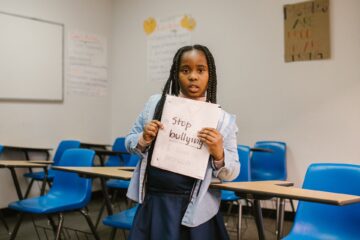Although every day is a good day to start afresh, there’s nothing wrong with encouraging new year resolutions for kids.
Every day is a good day to start afresh, but if there was going to be one day set aside to start all over, intentionally, it would be January 1st. And that’s why new year’s resolutions are all over the place.
When we look back on our lives – even kids – we tend to remember our past as an annual event. It’s almost always “the year” an event happened, whereas that particular event most likely happened in just a day.
Hence, why I think new year resolutions for kids is an even better tradition. With all the excitement, fireworks, and energized spirit, it’s a fine way to teach your kids how to make plans and stick to them.
Moreover, if done right, especially as a family unit/tradition, new year resolutions could strengthen the familial tie. Speaking about familial tie, here’s a list of games that makes for a great family game time.
Hollup, why do I get the vibe that you never thought that kids had plans for the new year too? They do have plans, although some of them are downright cute, adorable, and funny.
Resolutions ain’t just an adult thing and that’s all the more reason you should make it some sort of family ritual, that’s if you and your kids are fans.
But how do we make new year resolutions work for our kids?
Can Young Children Stick To Their New Year Resolutions?
Truth Time: The one most common reason why people loathe new year resolutions is that they don’t stick to it. If you stuck to every new year resolution made, then you’d be more excited about it…
Of course, children can stick to their resolutions if they approach it the right way, but just like us, it’s okay if they falter – it’s not a do or die affair.
Kids aged 7 to 12 are most likely to be excited with this idea and are more than able to stick with their resolutions, however, you can subtly introduce the idea to them at an earlier age.
First things first, teach kids how to draw up their resolutions for the year. Resolutions aren’t wishes; hence there are a few guidelines your kids should stick to.
Resolutions should be:
- Specific – You’ve probably heard this way too many times but it’s not a plan if it isn’t specific. Wanting to be the best football player in school is different from wanting to be the best defender. This is also different from outlining how to be the best defender.
- Realistic – Don’t be surprised if your kids come up with some very unrealistic plans. Be surprised if your kids do not come up with things like “going to mars” or “using makeup at age 10”. The goal should be attainable and realistic – it shouldn’t be an impossible dream.
- Relevant and important to your child – do all it takes to not get carried away and turn your child’s resolutions to yours. It should be things they want, not what you want. Guide them but don’t overtake.
- Measurable – If they can’t measure their progress, then perhaps they need to rephrase the plan. A good resolution should allow your child to track their progress.
- Result-oriented – If your child is putting in efforts, then they should see some sort of result. If your child’s science grade is C and they want an A, then having a B, is progress. Or maybe they’re trying to learn a 4-step dance move, getting 3 moves right becomes a result.
- Time-specific – Good resolutions for kids should be time-specific. For kids, instead of making it annually, you can help break their long-term plans into smaller checkpoints (quarterly checkpoints).
New Year Resolutions For Kids – How To Help Kids Stick With Their Plans
Resolutions for kids can be goals that are based on improving their social skill, academics, art & creativity, athletic and mental skills.
To help kids stick with these plans, it will be helpful to keep a few things in mind:
- Be positive about the resolutions spirit: If your child is into the ritual and you’re not, then don’t be pessimistic about it. Cheer them on, don’t discourage them.
- Be a role model: Show them how it should be done and encourage them to get one. We all make resolutions one way or the other. It doesn’t have to be on the first day of the new year, so you can always be a role model.
- Share your resolutions journey with them. Let them in on how far you’ve gone with your plans and where you’ve faltered.
- If it’s a goal that you can join them in, then volunteer to do so.
- Help them break down their bigger goals into mini-goals. For instance, if the time-span for a goal is 6 months, create bimonthly checkpoints for the goal, and break it into smaller goals.
- Ensure that their resolutions are SMART – specific, measurable, attainable, results-oriented, and time-specific.
- Narrow down their number of resolutions, if they make too many. Too many goals will lead to chaos. It will be difficult to tackle each one effectively. If it’s impossible to narrow it down, which is unlikely, then start the year with the more urgent and pressing goals.
Why You Should Make New Year Resolutions A Family Ritual
Before the party poopers come along and ruin the holiday spirit, here are a few reasons why this is worth being a family ritual.
- As a family ritual, it brings the family closer and strengthens the tie that binds y’all.
- It improves your child’s level of self-reflection, problem-solving skill, analytical and critical thinking skills, self-awareness, and even boosts their self-esteem.
- It creates an atmosphere for kids to communicate their dreams and goals.
- New year resolution is a good way to teach kids self-discipline.

The Gist
Remember, when it comes to new year resolutions for kids or adults, it is okay to adjust some goals as you progress. Or even take out a goal if it no longer aligns with your values.
Encourage your kids to make resolutions that develop them intellectually, emotionally, socially, physically, psychologically, and even financially.
And here’s some good news, research shows that people who make new year resolutions are more likely to improve personally than those who don’t.
So, while your child might not be able to fulfil all of their resolutions, they’ll surely have done well on the self-improvement scale.
Plus, the last day of the year shouldn’t be the evaluation date of your resolutions. Moreover, not all resolutions have a time-span of 12 months.
If your goal is a one-month plan, then take an evaluation biweekly or at the end of the month. If it’s a 6 months plan, then create monthly evaluation checkpoints.
For kids, new year resolutions shouldn’t be mere wishes and hopes. They can be SMART.

